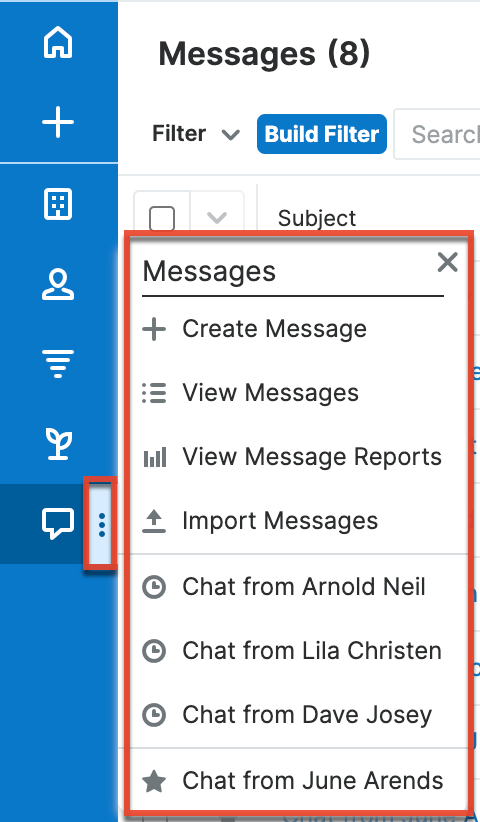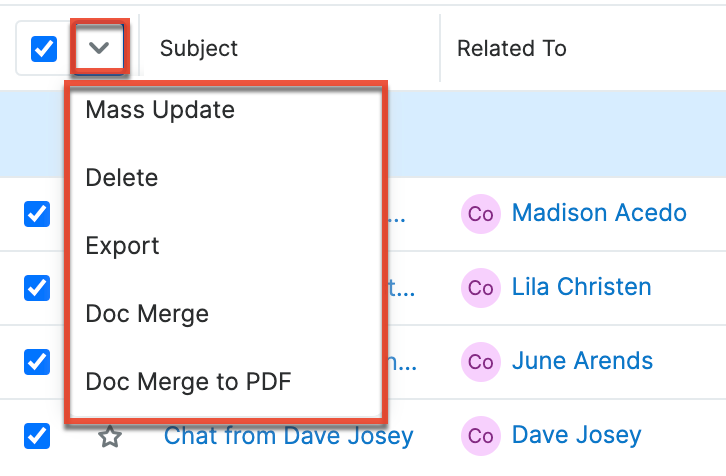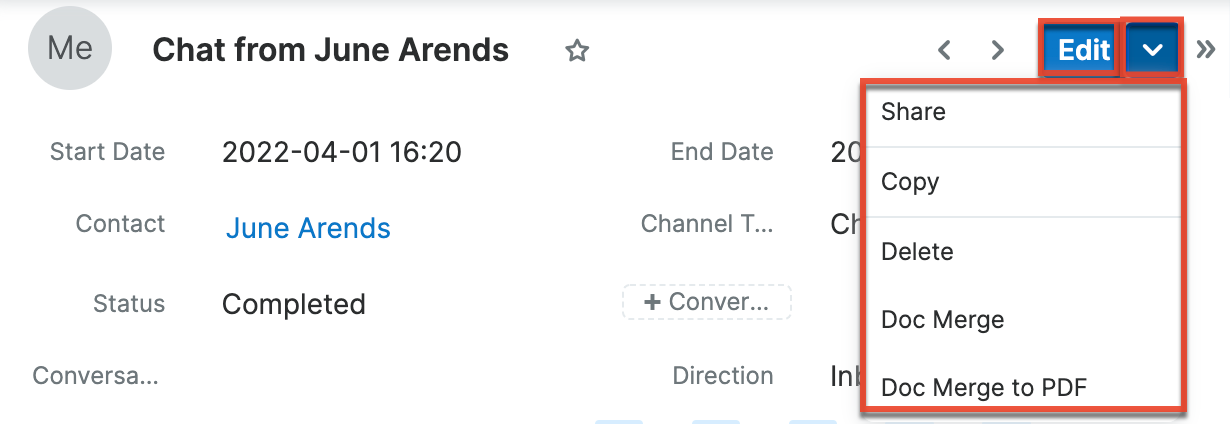Messages
Overview
Sugar's Messages module consists of messages, which often represent historical records of instant messaging chats that took place between two people. The Related To flex-relate field is typically set to the module and record to which the message's contents are relevant. Contact, lead, or user records can also be related using the Guests panel, which will cause the message to be displayed in the Messages subpanel when viewing the record.
This documentation covers information and actions specific to the Messages module. For instructions concerning views and actions that are common across most Sugar modules, such as creating, editing, and deleting messages, please refer to the Working With Sugar Modules section of this page.
Please note that you will only be able to see message records as allowed by your license type, team membership, assigned roles, and user access type. For more information, please refer to the referenced documentation in the Administration Guide.
Message Fields
The Messages module contains a number of stock fields that come out-of-the-box with Sugar. For information on using and editing various field types, refer to the User Interface documentation. The definitions below are suggested meanings for the fields, but the fields can be leveraged differently to best meet your organization's needs. Administrators or users with developer-level role access have the ability to alter, add, or remove fields via Admin > Studio. For more information on configuring fields, please refer to the Studio documentation in the Administration Guide.
| Field | Description |
| Assigned To | The Sugar user assigned to the message. |
| Channel Type | The type of channel used for the communication (e.g., chat). |
| Conversation | Accessible to Sugar Sell or Serve users, if the message was created by SugarLive, this field contains the transcript from the chat conversation. This field is read-only. |
| Conversation Link | The link to the transcript of the conversation if it is stored outside of Sugar. |
| Date Created | The date the message was created. |
| Date Modified | The date the message was last modified. |
| Description | A description of this message. |
| Direction | The direction of the message (e.g., Inbound). |
| End Date | The date and time the message ended. |
| Integration Sync ID | The sync key field used by external integrations to identify Sugar records in the external application. See the Integrate REST API endpoints in the Developer Guide for more details on how to use this field. |
| Related To | The module and record that is related to this message. |
| Start Date | The date and time the message started. |
| Status | The status of the message (e.g., Completed). |
| Subject | The subject or designation of the message. |
| Tags | User-created keywords that can be used to identify records in filters, dashlets, and reports. Note: For more information on creating and using tags, please refer to the Tags documentation. |
| Teams | The Sugar team(s) assigned to the message record. |
Message Guests
The following guests are automatically added to a message's guest list:
| Automatic Guest | To Remove the Guest |
| The lead or contact in the "Related to" field, if any | This guest can be removed from the guest list at any time. If a lead or contact record is related to a message but is not on the guest list, then you will not see the message in the person's Messages subpanel. |
| The user who created the message | This guest can be removed from the guest list after initially saving the message. Create and save the call, click "Edit", and then click the Remove (-) button next to the created-by user's row in the Guests panel. |
| The user in the "Assigned to" field for the message record | The assigned user cannot be removed from the guest list. If you need to remove the assigned user from the guest list, you must first re-assign the message to a different user. Once the message record is assigned to a new user, the original user will remain a guest until removed via the Remove (-) button. |
Users may add additional guests (e.g., contacts, leads, users) to messages via the Guests panel in the message's record view.

Adding via the Guests Panel
Use the following steps to add attendees via the Guests panel:
- Navigate to the Messages module and create a new record or edit an existing record.
- Scroll to the Guests panel and click on the Add (+) button located on the far right.

- To add a guest, type in the name of the lead, contact, or user via the search bar that appears or select "Search for more..." to search the Contacts list view. To remove a guest, click the Remove (-) button to the right of the guest's row.
Note: The user in the "Assigned to" field on the message record cannot be removed from a message. To remove the assigned user from the guest list, re-assign the message to a different user first.
- Click "Save"
Adding via Create a Guest
Use the following steps to create a new contact and add them as a message guest:
- Navigate to the Messages module and create a new record or edit an existing record.
- Scroll to the Guests panel, click on the Add (+) button, and then click on "Search for more..." to expand the Contacts list view.

- At the top of the list view, click the Create button and fill out the appropriate fields to create a new contact. Once completed, save the new contact record and Sugar will automatically add the contact to the guest list for the message.
- Confirm the remaining fields and guests are configured appropriately and then save the message.
Working With Sugar Modules
While the Messages module has some features that only apply to messages it also uses the Sidecar user interface that most Sugar modules are based on. The following sections detail menus, views, and actions common to Sidecar modules and contain links to additional information within the page or links to the User Interface documentation.
Message Menus
The Messages module contains various options and functionality that are available via menus in the module tab, list view, and record view. The following sections present each menu and its options with links to more information about each option in the User Interface documentation.
Module Tab Menus
Click the Messages module tab in the navigation bar to access the Messages list view. You may also click the three-dots menu in the Messages module tab to display the Actions, Recently Viewed, and Favorites menus. The Actions menu allows you to perform important operations within the module. The Recently Viewed menu displays the list of messages you most recently viewed. The Favorites menu displays the list of messages you most recently marked as favorites. 
The module tab's Actions menu allows you to perform the following operations:
| Menu Item | Description |
| Create Message | Opens the record view layout to create a new message. |
| View Messages | Opens the list view layout to search and display messages. |
| View Message Reports | Opens the Reports list view filtered to reports that target the Messages module. |
| Import Messages | Opens the import wizard to create or update messages using external data. |
For more information on module tab menus including reasons a module may not be included in the menu, see the User Interface documentation.
List View Menus
The Messages list view displays all message records and allows for searching and filtering to locate specific messages. You can view the basic details of each record within the field columns of the list view or click a message's subject to open the record view. To access a module's list view, simply click the module's tab in the navigation bar.
List View Mass Actions Menu
The Mass Actions menu to the right of the checkbox option in the list header allows you to perform mass actions on all currently selected records. You can use the checkbox on each record's row to select individual message records or click the checkbox in the list header to select all records displayed in the current set of list view results.
The Mass Actions menu allows you to perform the following operations:
| Menu Item | Description |
| Mass Update | Mass update one or more messages at a time. |
| Recalculate Values | Visible only if the module contains fields using Sugar Logic and only to System Administrators or users with Developer-level role access, this option will refresh the selected records' calculated values. |
| Delete | Delete one or more messages at a time. |
| Export | Export one or more messages to a CSV file. |
| Doc Merge | Select or create a DOCX template to merge record data into documents that will be accessible in the Doc Merge widget. |
| Doc Merge to PDF | Select or create a DOCX, XLSX, or PPTX template to merge record data into PDF documents that will be accessible in the Doc Merge widget. |
List View Record Actions Menu
The Record Actions menu to the far right of each record's row allows you to perform actions on the individual message directly from the list view.
The list view's Record Actions menu allows you to perform the following operations:
| Menu Item | Description |
| Preview (Eye icon) | Preview this message in the intelligence pane. |
| Edit | Edit this message. |
| Delete | Delete this message. |
| Doc Merge | Select or create a DOCX, XLSX, or PPTX template to merge record data into documents that will be accessible in the Doc Merge widget. |
| Doc Merge to PDF | Select or create a DOCX, XLSX, or PPTX template to merge record data into PDF documents that will be accessible in the Doc Merge widget. |
Record View Actions Menu
The Messages record view displays a single message in full detail including its fields, subpanels of related records (if applicable), and activity stream. To access a message's record view, simply click a hyperlinked message subject from anywhere within Sugar. The record view's Actions menu appears on the top right of the page and allows you to perform various operations on the current record.
The Actions menu allows you to perform the following operations:
| Menu Item | Description |
| Edit | Edit this message. |
| Share | Share a link to this message via email. |
| Copy | Duplicate this message. |
| Delete | Delete this message. |
| Doc Merge | Select or create a DOCX, XLSX, or PPTX template to merge record data into documents that will be accessible in the Doc Merge widget. |
| Doc Merge to PDF | Select or create a DOCX, XLSX, or PPTX template to merge record data into PDF documents that will be accessible in the Doc Merge widget. |
Common Views and Actions
In the table below, the left column contains links to the User Interface page covering topics that are applicable to all Sidecar modules. The right column has links to sections of the current page that cover topics specific to messages.
| General Instructions for Working With Sugar Modules | Messages-Specific Instructions |
| Use the links below to navigate to the User Interface page which covers topics generic to many Sugar modules. | When Messages-specific help exists for each topic, use the links below to navigate to sections of the current page. |
| Creating Records | |
| Viewing Records | |
| Searching for Records | |
| List View | List View Mass Actions Menu List View Record Actions Menu |
| Record View | Record View Actions Menu |
| Intelligence Pane | |
| Editing Records | |
| Deleting Records | |
| Exporting Records | |
| Favoriting Records | |
| Sharing Records |